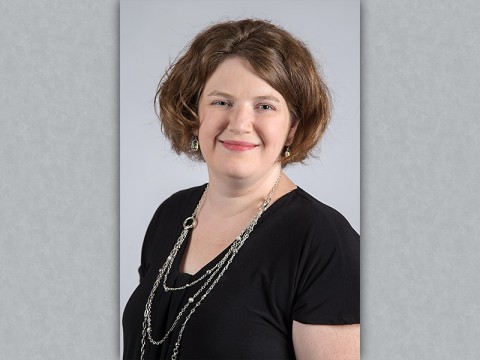 Clarksville, TN – Bitten by a spider while shaking out a towel on one sunny afternoon, Austin Peay State University assistant professor of biology Dr. Amy Thompson did the first logical thing after an encounter with an eight-legged pest – she buried her nose in a book.
Clarksville, TN – Bitten by a spider while shaking out a towel on one sunny afternoon, Austin Peay State University assistant professor of biology Dr. Amy Thompson did the first logical thing after an encounter with an eight-legged pest – she buried her nose in a book.
“At first, I thought it was a bee sting, but then I noticed the spider scurrying off,” Thompson said. “So being an academic, I was like, ‘oh gosh, I have to find out more about this spider.’”

It was Thompson’s journal which earned her a spot on the ASCP’s inaugural 40 Under 40, a program spotlighting 40 pathologists, pathology residents and laboratory professionals under age 40 who are making significant contributions to the profession.
While other members of the academic community joined Thompson as honorees, the APSU professor is the lone representative of a university without an associated medical school.
“There are one or two other professors on the 40 Under 40 list, but they are more like clinical professors, because they work in a different setting with a set-up where maybe they are practicing in addition to their teaching duties,” Thompson said. “So I was really surprised because I am the only honoree who comes from a ‘traditional’ university environment.”
Thompson’s research shined a light on the brown recluse spider — a creature somewhat unexplored in her research circles. The spider has a small regional footprint, rarely seen outside of the central United States. True to their reclusive nature, the spiders are more active at night — often lurking in wooded areas or in the dark attics and basements of homes.
Unlike more commonly seen spiders, brown recluse are not natural hunters. Because they attack by injecting their venom and fleeing, only to return later for their prey, many humans do not notice the spider after they are bitten.
It was the low profile of the brown recluse, Thompson said, that really sparked her interest as a research subject.
“When I started my research, I saw there wasn’t very much information out there about brown recluse spiders,” Thompson said. “Because of their small area that they live in, there really aren’t many people impacted by them, so there was not a great deal of information out there.
Thompson went to work, conducting an extensive lab study into the effectiveness of prednisone on the venom released by the brown recluse. At the same time, the APSU professor explored new ways of dealing with infestations of the spider.
“The reason (traditional pesticides) are not really effective with brown recluse is because they walk up so highly that most normal pesticides never make contact with their bodies,” Thompson said. “ So the other project we’ve been working on is looking at the sodium channels in spider legs. If you could block those channels, which send signals to the brain (to move), then their legs would go numb and cause them to fall into the pesticides.”
Since being named to the inaugural 40 Under 40 list, Thompson has continued to work closely with ASCP, recording continuing education podcasts on her research, as well as serving as a member of the selection committee for the 2015 edition of the organization’s 40 Under 40 list.
Thompson was also recently tapped by the ASPC to help create a credentialing program for medical technology, titled “Lab Management University.” One of the first of its kind, the program is for individuals moving into leadership positions in a lab environment.
“I was really excited to be selected (as a 40 Under 40 honoree) because it was definitely not something that I expected,” Thompson said. “I debated where I was going to do it at first, but I’m very glad because it was a major honor and now I feel like I am really connected to the (pathologist) community again.”


